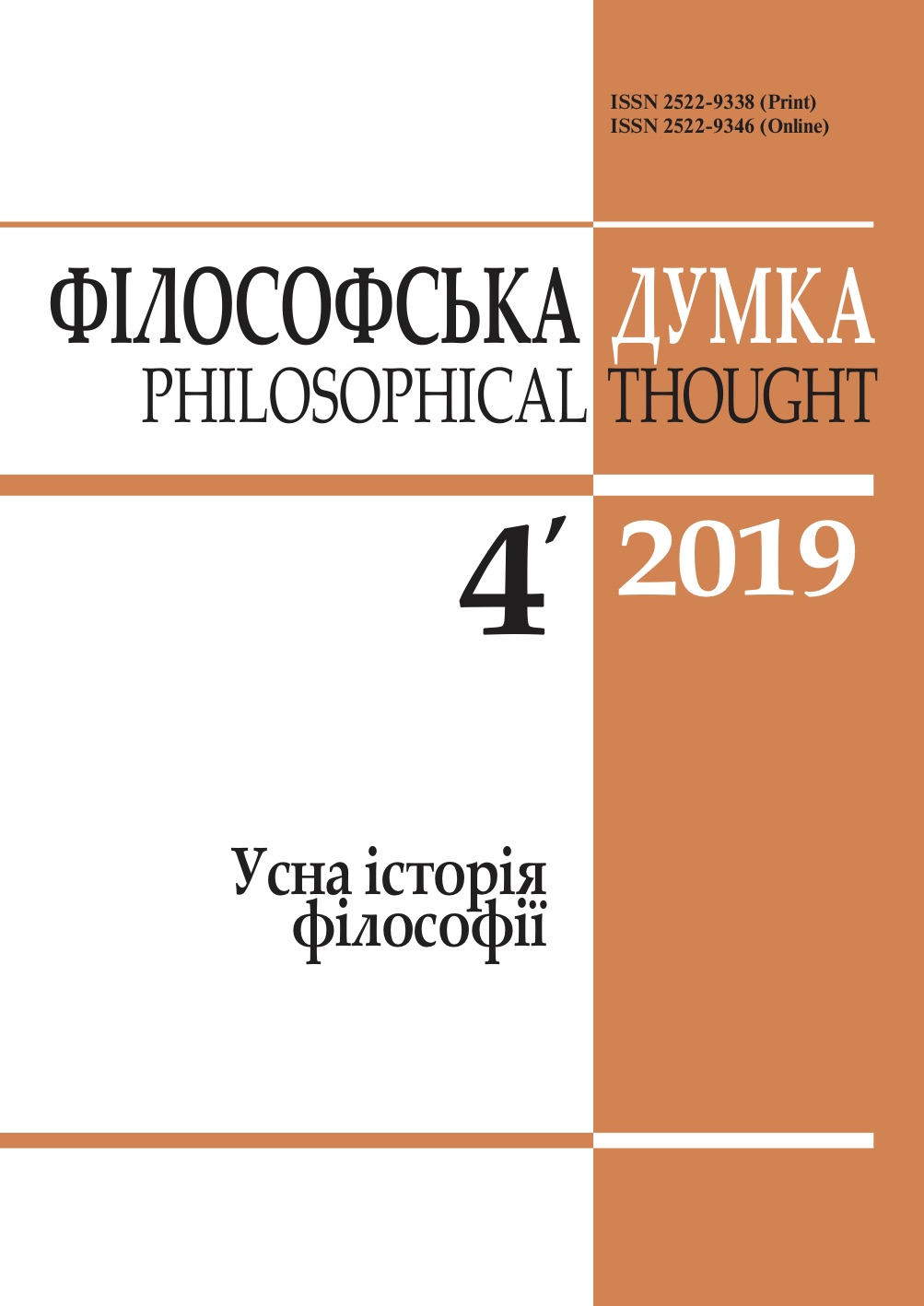The necessity of reflection in the oral history of philosophy
DOI:
https://doi.org/10.15407/fd2019.04.053Keywords:
interview, theory, empirical data, narrativeAbstract
The oral history of philosophy is in the process of establishing. The article argues that this discipline is fundamentally different from the oral history of philosophers because the oral history of philosophy has to produce besides the empirical data (interview texts) but also a theoretical reflection that is inherent in any form of philosophy. The core product of oral history is the living narrative of a witness, which is only a starting point for the oral history of philosophy that has to work for philosophical generalizations. This article describes for the first time four possible types of reflection in the oral history of philosophy at the empirical level: (1) at the stage of developing the plan and purpose of the interview, when the historian of philosophy identifies the type of empirical data needed to achieve the primary purpose of his research; (2) between views of an interviewer and a respondent, when the interview appears as a common reflection between those two not just as an adjustable conversation; (3) at the reflection level of the respondent (if he or she is a philosopher) preceded the interview; (4) in the mind of the reader / viewer of the interview, who is able to actively rethink ideas expressed in the interview. Types 1-3 of reflection are central to the oral history of philosophy as a discipline (type 4 is not scientific and belongs to the field of public opinion). Consequently, the result of the empirical research of the oral history of philosophy is not only the empirical data itself but also the primary reflections that need to be developed at the next theoretical stage of research. At the same time, the oral history of philosophy can be both a source of data (that is a special interviewing methodology relevant to any type of the history of philosophy), and a relatively independent discipline, the history of philosophy study primarily based on interview material.
References
Abrams, L. (2010). Oral History Theory. London, & New York: Routledge. https://doi.org/10.4324/9780203849033
Aeschimann, E., Cassin, B. (2014, September 20). Barbara Cassin: “Nous savions tous que Heidegger avait été nazi”. Retrieved June 20, 2019 from bibliobs.nouvelobs website: https://bibliobs.nouvelobs.com/essais/20140919.OBS9704/barbara-cassin-nous-savions-tous-que-heidegger-avait-ete-nazi.html?fbclid=IwAR3DHDGYGyY61Kl2EMfVCfyGXanpIJPTrH2nF1Hk37%20SCX7IMKrNqrm%205XgYg
Bennett, J. (1983). Human Values in Oral History, Oral History Review, 11, 1-15. https://doi.org/10.1093/ohr/11.1.1
Brunschvicg, L. (1921). L'idéalisme contemporain, Paris: Alcan.
Bulatov, M. (2009). Reflection. [In Ukrainian]. In V. I. Shynkaruk et al. (Eds.), Philosophical encyclopedic dictionary (p. 547). Kiev: Abrys. [= Булатов 2009]
Chayka, T. (2009). Touch. Presentation of the project “Oral Stories of Philosophers”. Filosofska Dumka, 3, 140-145. [= Чайка, 2009]
Chayka, T., Gorsky, V. (2012). Conversations with Vilen Gorsky. My Institute. The Island of Happiness. Filosofska Dumka, 2, 98-106. [= Чайка, Горский 2011]
Chayka, T., Krymsky, S. (2011). Conversations with S. Krymsky. The last cassette. Filosofska Dumka, 1, 128-145. [= Чайка, Крымский 2011]
Depra, N. (2013). Erleben, erlebnis…. [In Ukrainian]. In B. Cassen, K. Sigov (Eds.), The European dictionary of philosophies: The lexicon of untranslatability (vol. 3, pp. 26-29). Kiev: Duh i Litera. [= Депра 2013]
Hildebrand, D. (2008). What is philosophy? [In Ukrainian]. Lviv: Koleso. [= Гільдебранд 2008]
Hodgson, S. H. (1878). The Philosophy of Reflection (2 vols.). London: Longmans, Green and Co.
Kahneman, D. (2011). Thinking, Fast and Slow. New York: Farrar, Straus and Giroux.
Krymsky, S., Chayka T. (2012). Sergei Krymsky: Our Life-Long Talk. (The cycle of T. A. Chayka’s interviews). [In Russian]. Kyiv: Dmitry Burago’s Publishing House. [= Крымский, Чайка 2012]
Priest, S. (2005). Brunschvicg, Léon. In Ted Honderich (Ed.), The Oxford Companion to Philosophy (p. 111). Oxford: Oxford University Press.
Rorty, R. (1984). The Historiography of Philosophy: Four Genres. In R. Rorty, J. B. Schneewind, & Q. Skinner. (Eds.). Philosophy in history: essays on the historiography of philosophy. Cambridge: Cambridge University Press. https://doi.org/10.1017/CBO9780511625534
Terkel, S. (1970). Hard Times: An Oral History of the Great Depression. New York: Avon.
Turner, W. (2016). History of Philosophy. Boston, U.S.A, & London: Ginn & Company.
Vansina, J. (1985). Oral tradition as history. Madison, Wis.: University of Wisconsin Press.
Yow, V. R. (2005). Recording oral history: a guide for the humanities and social sciences. Walnut Creek, CA: AltaMira Press.
Downloads
-
PDF (Українська)
Downloads: 445
Published
How to Cite
Issue
Section
License
Authors who publish with this journal agree to the following terms:
- Authors retain copyright and grant the journal right of first publication.
- Authors are able to enter into separate, additional contractual arrangements for the non-exclusive distribution of the journal's published version of the work (e.g., post it to an institutional repository or publish it in a book), with an acknowledgement of its initial publication in this journal.
- Authors are permitted and encouraged to post their work online (e.g., in institutional repositories or on their website) prior to and during the submission process, as it can lead to productive exchanges, as well as earlier and greater citation of published work (See The Effect of Open Access).


